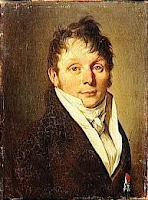

Madness: Revelations of the Mind
======= /// =======
[from “The Black Monk” by
Anton Chekhov*]
Hardly had he [Andrey Kovrin]
recalled that legend, conjuring up the dark spectre he had seen in the rye
field when quite silently, without the slightest rustling, a man of medium
height, his grey head uncovered, all in black, barefoot like a beggar, his
black eyebrows sharply defined on his deathly white face, slipped out from
behind the pine trees just opposite. Nodding his head welcomingly, this beggar
or pilgrim silently came over to the bench and Kovrin could see it was the
black monk. For a minute they both eyed each other – Kovrin in assessment, the
black monk in a friendly way, with that same rather crafty look.
‘You’re just a mirage,’ Kovrin
murmured. ‘Why are you here, sitting still like that? It doesn’t tally with the
legend.’
‘Never mind,’ the monk answered
softly after a brief pause, turning his face towards him. ‘The legend, myself,
the mirage are all products of your overheated imagination. I’m an apparition
…’
‘That means you don’t exist?’ Kovrin
asked.
‘Think what you like,’ the monk said
with a weak smile. ‘I exist in your imagination, and your imagination is part
of nature, so I exist in nature too.’
‘You have a very aged, clever and
extremely expressive face, as if you really have lived more than a thousand
years,’ Kovrin said. ‘I didn’t know my imagination could create such phenomena.
But why are you looking at me so rapturously? Do you like me?’
‘Yes. You’re one of the few who are
rightly called God’s Chosen. You serve Eternal
Truth. Your ideas, intentions, your amazing erudition, your whole life – all
bear the divine, heavenly stamp, since they are devoted to the Rational and the
Beautiful, that is, to the Eternal.’
‘You mentioned “Eternal Truth” … But
is that within men’s reach, do they need it if there’s no such thing as eternal
life?’
‘There is eternal life,’ the monk
said.
‘Do you believe in immortality?’
‘Yes, of course. A great, bright
future awaits you human beings. And the more men there are like you on earth,
the quicker will the future come about. Without men like you serving the
highest principles, living intelligently and freely, humanity would be
worthless. In the normal course of events it would have to wait a long time for
its life upon earth to come to an end. But you will lead it into the Kingdom of Eternal Truth a few thousand years ahead
of time – this is your noble service. You are the Embodiment of God’s blessing
which has come to dwell among men.’
‘But what is the purpose of eternal
life?’ asked Kovrin.
‘Like any other kind of life –
pleasure. True pleasure in knowledge, and eternal life will afford innumerable
and inexhaustible sources of knowledge: this is the meaning of the saying, “In
my Father’s house are many mansions.”’
‘If you only knew how enjoyable it is
listening to you!’ Kovrin said, rubbing his hands with pleasure.
‘I’m very pleased.’
‘But I know one thing: when you’ve
gone I’ll start worrying whether you really do exist. You’re a phantom, a
hallucination. Does that mean I’m mentally ill, insane?’
‘Even if that were so, why let it bother
you? You’re ill from overworking, you’ve worn yourself out. I’m trying to say
that you’ve sacrificed your health for an idea and it won’t be long before you
sacrifice your very life to it. What could be better? All noble spirits blessed
with gifts from on high have this as their aim.’
‘If I know that I’m mentally ill, how
can I have any faith in myself?’
‘But how do you know that men of
genius, in whom the whole world puts its faith, haven’t seen ghosts too?
Nowadays scientists say genius is akin to madness. My friend, only the
mediocre, the common herd are healthy and normal. Thoughts about an age of
neurosis, overwork, degeneracy and so on can seriously worry only those for
whom the purpose of life lies in the present – that is the common herd.’
‘The Romans used to speak of mens sana in corpore sano.’
(**)
‘Not all that the Greeks and Romans
said is true. Heightened awareness, excitement, ecstasy – everything that
distinguishes prophets, poets, martyrs to an idea, from ordinary people is
hostile to man’s animal side – I mean his physical health. I repeat: if you
want to be healthy and normal, go and join the herd.’
___________________________________
* Source: Anton Chekhov,
“The Black Monk” (translated by Ronald Wilks, 1982)
**
from Latin: healthy mind in a healthy body.

